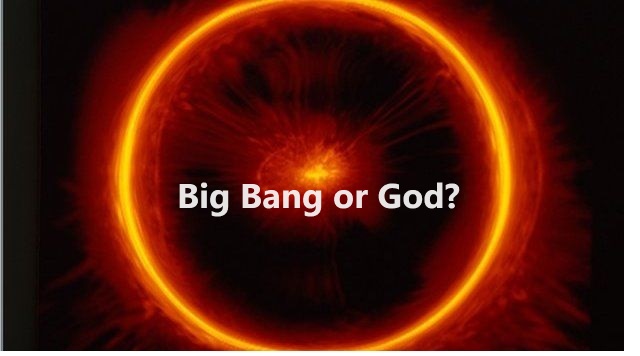Big Bang or God?

Which answer makes more scientific sense?
It started simply enough: the Texas State Board of Education took a refreshing stand against the Left indoctrination in our K-12 Science textbooks (see here).
A scientist I know (who is sympathetic to fixing textbooks), wrote a cautionary email:
I agree that this is a victory of sorts. But note that it was part of an effort to insert Creationism into school textbooks. That is a clear step backward because our efforts become linked to religious efforts, not scientific ones.
Creationism is fine. It is just NOT science.
Our efforts should be understood as 100% science and 0% religion. Similarly, we are 100% non-partisan, even though our efforts coincide with those who are religious and conservative.
Our opponents continually try to connect us to right-wing political and religious groups. This gives them yet another opportunity to do so. Similarly, our friends want to draw us into their religious and political activities. We must make it clear that we are not a party to those even if individually we certainly have religious and political opinions.
I wrote back:
Maybe I misunderstood the situation, but it seems to me that the Texas Board of Education is doing what is consistent with Critical Thinking and Science.
To be open to Creationism is not a religious effort, but rather an effort to consider possible alternatives to the Big Bang hypothesis plus the evolution hypothesis.
Since neither the Big Bang hypothesis nor the evolution hypothesis are scientifically proven, students should be open to alternative explanations.
To say that K-12 schools should only teach the Big Bang hypothesis or the evolution hypothesis, is as wrong as them only teaching the climate change hypothesis.
IMO our education system should acknowledge to students that:
1 – there are many things that Science does not currently know for a fact, and
2 – that means there are multiple options that we should be open to considering.
The end result is that students should do research plus Critical Thinking, and then come to their own conclusions.
This is exactly what we want them to do regarding climate change, so why should it differ elsewhere?
Another scientist friend then chimed in, disagreeing with me, saying:
I would respectfully take issue with your argument. The Scientific Method, as you have so often argued, is the testing of hypotheses against empirical evidence.
Students should always be open to alternative hypotheses, but only those which can be subjected to empirical testing.
The problem with Creationism is that it is not falsifiable and cannot be tested empirically. As a result, it is not a scientific hypothesis.
Creationists often point to issues and discrepancies in both evolution and the Big Bang theory, but issues with one hypothesis do not represent evidence for a specific alternative hypothesis.
In my humble opinion, Creationism belongs in Sunday school and not in science class.
My response to that was:
TY for your respectful comments.
I never said Creationism was scientifically proven. I said that it is an alternative possibility, every bit as worthy of consideration as the Big Bang hypothesis is.
Not everything in life has a scientific explanation.
Furthermore, the Big Bang hypothesis is not subject to falsification, so by that standard, schools should not be teaching that either…
No further response from either scientist…
If we want to look at this scientifically, here is a scientific question that I pose: Are humans the most advanced beings in the universe?
The answer can not be YES, as that would make no sense. We do not understand even 1% of our existence. For example, multiple forces exist at the atomic level. Where did they all come from? Basically, we are left with two answers:
1 – Chance. That’s essentially the conclusion from the Big Bang hypothesis: everything we have today just coincidentally worked out. The statistical likelihood of that happening is one chance in a trillion quadrillion.
2 – A Higher Being.
If the answer is NO, then keep repeating that question to whatever beings are identified as being more advanced. At some point, you’ll come to “God.”
BTW, for those who want to avoid “religion” and strictly stick to “Science,” then check out what the Big Bang hypothesis actually is (e.g., see here):
“At the earliest moments of the Big Bang, all of the matter, energy, and space was compressed into an area of zero volume and infinite density. Cosmologists call this a singularity.” What is a “singularity”? See here: “It is a place in the universe where our laws of physics simply break down.”
In other words, it’s ludicrous to call the Big Bang hypothesis a “Science” explanation, as it is defined as a state where the laws of physics don’t work!
As a physicist, it is a thousand times more sensical that the universe was started by a much Higher Power Being, as opposed to the Big Bang hypothesis, as the later is premised on numerous unexplainable and scientifically irrational assumptions.
In other words, when our schools tell students that Creationism should be considered as an explanation of the origins of the universe, that is based on Science, not religion.
©2023. John Droz, Jr. All rights reserved.


Leave a Reply
Want to join the discussion?Feel free to contribute!